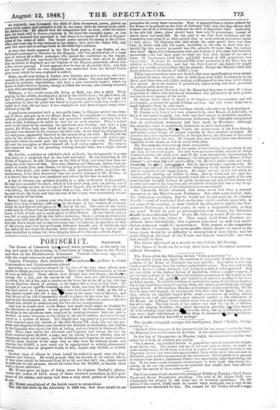At Aigbnrth, near Liverpool, the child of John Greenwood, porter,.
picked up some waste paper, and crumpled it idly in one hand, while he carried in the other his father's tea. He played with his companions half an hour, while his father took his meal, still by chance retaining in his hand the crumpled paper: at last his father observed and examined it, and found it to consist of Bank-of-England notes of the value of 4501. The honest porter carried the money to the Police- office, and next day it was restored to the owner; who gave the father 101., and paid 101. more into a savings-bank on the little boy's account.
A story has lately appeared in the New York papers, of one Curtis, an un- fortunate passenger to America by the Niagara, who was swindled out of a large gem of money by a fellow passenger, who gained his confidence on the voyage. Much sympathy was expressed for Curtis: subscriptions were raised to enable him to return to England, and the Captain of the Niagara generously offered him a free return-passage. It now appears that he was an absconded clerk; and that the money of which he was despoiled was -embezzled from the Salford Union poor-rates, which he was employed to collect.
Elder, an old man living at Lochee, near Dundee, has shot a woman who tres- passed on his potato-field and pulled a few of the plants. The man had been exas- perated by previous depredations, and kept a gun constantly loaded; which he seems to have fired at random, though it killed the woman, and severely wounded a man who accompanied her.
Williams, a boy twelve years old, living at Bath, has shot a child. While playing in the streets, he snapped a pistol at the child's head; the pistol went off, and a bullet passed through the brain. The account given by the boy and his companions is, that the pistol was found in a garret; and though they could see a bullet in it they did not know it was charged—it had been snapped many times without going of
A gentleman connected with a mercantile house in Glasgow arrived one even- ing at Oban, and pat up at the King's Arms Inn: he complaiued of illness' and a medical practitioner attended him and prescribed medicines; and very late be went to bed, desiring to be called in time for an early steamer. When a waiter went to his room in the morning, the gentleman was missing; and, after a long search, his lifeless body was found at the base of a rock ninety feet high. The deceased was dressed in his trousers and shirt only; in one hand was al quantity of ivy and grass, apparently clutched in the descent from the rock. He bad left his room by the window; whence he bad to drop from a house and scale several gar- den-walls before he could gain the street on his way to the rock. Whether he fell over the precipice, or threw himself off, is of course unknown. The surgeon who attended him on the preceding evening thought there was a slight mental aberration.
Mr. Iredale, a solicitor or solicitor's clerk at Leeds, has disappeared, in a way, that leads to a suspicion that he has been murdered. He was travelling. in the North of England; he left. Durham on the 10th of July, and since that time no- thing has been heard of him. Two men, Bunting and Bateman' having been ar- rested at South Cave, near Hessle, fur having property—shirts, collars, a pocket- book, a fruit-knife, and other things—in their possession under auspicious cir- cumstances, it has been discovered that the articles belonged to Mr. Iredale; so it is feared that he has been murdered and robbed by the men in custody.
A boy of thirteen has perished horribly in a mine at Gannow in Lancashire. He had just ascended the shaft, which is 175 yards deep, and ens getting out of the tub, having one foot on the edge of it—it slipped, and he fell down the shaft —in falling, the body came in contact with a stay, and it was torn to pieces: a leg and thigh, the head, and then the rest of the corpse, were successively dashed to the bottom of the mine.
Several days ago, a young man who lived at No. 122, line Saint Martin, was found dead from voluntary suffocatigo by the fumes of two brazier& of charcoal, which he had lighted and placed at Me foot of his bed. The cause of his suicide could only be divined from his having closely grasped in his right hand, against his heart, a lock of hair, and a small parcel of dried flowers. He was buried, and all was left to conjecture till the 'day before yesterday, when a young mantuamaker made away with herself in the tame manner, leaving .behind her a letter, desiring that her death. might not be imputed to any one, but takemas an expiation fur that of the young man who had previously destroyed himself, and of which she was the cause by her desire for luxuries above their means, which he had not suffi- cient resolution to refuseher, thus bringing himself to.dia-tress.—Paris Paper.
























 Previous page
Previous page